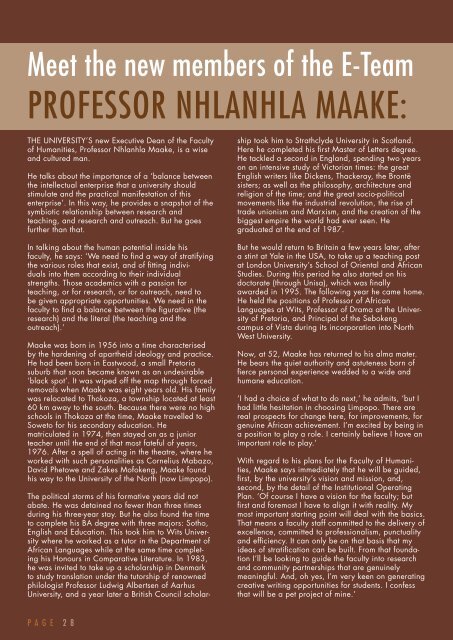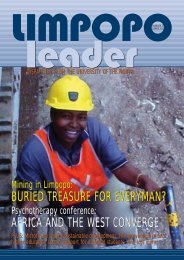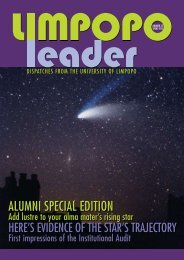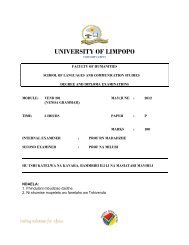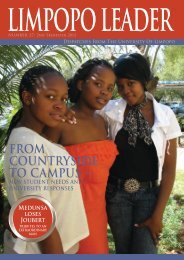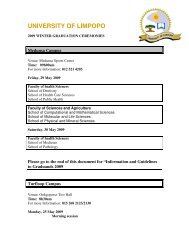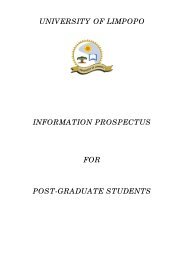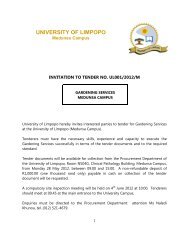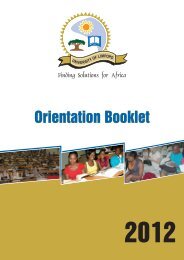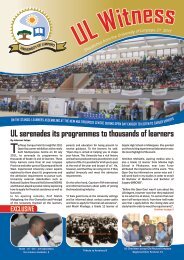Limpopo Leader - University of Limpopo
Limpopo Leader - University of Limpopo
Limpopo Leader - University of Limpopo
- No tags were found...
Create successful ePaper yourself
Turn your PDF publications into a flip-book with our unique Google optimized e-Paper software.
Meet the new members <strong>of</strong> the E-TeamPROFESSOR NHLANHLA MAAKE:THE UNIVERSITY’S new Executive Dean <strong>of</strong> the Faculty<strong>of</strong> Humanities, Pr<strong>of</strong>essor Nhlanhla Maake, is a wiseand cultured man.He talks about the importance <strong>of</strong> a ‘balance betweenthe intellectual enterprise that a university shouldstimulate and the practical manifestation <strong>of</strong> thisenterprise’. In this way, he provides a snapshot <strong>of</strong> thesymbiotic relationship between research andteaching, and research and outreach. But he goesfurther than that.In talking about the human potential inside hisfaculty, he says: ‘We need to find a way <strong>of</strong> stratifyingthe various roles that exist, and <strong>of</strong> fitting individualsinto them according to their individualstrengths. Those academics with a passion forteaching, or for research, or for outreach, need tobe given appropriate opportunities. We need in thefaculty to find a balance between the figurative (theresearch) and the literal (the teaching and theoutreach).’Maake was born in 1956 into a time characterisedby the hardening <strong>of</strong> apartheid ideology and practice.He had been born in Eastwood, a small Pretoriasuburb that soon became known as an undesirable‘black spot’. It was wiped <strong>of</strong>f the map through forcedremovals when Maake was eight years old. His familywas relocated to Thokoza, a township located at least60 km away to the south. Because there were no highschools in Thokoza at the time, Maake travelled toSoweto for his secondary education. Hematriculated in 1974, then stayed on as a juniorteacher until the end <strong>of</strong> that most fateful <strong>of</strong> years,1976. After a spell <strong>of</strong> acting in the theatre, where heworked with such personalities as Cornelius Mabazo,David Phetowe and Zakes M<strong>of</strong>okeng, Maake foundhis way to the <strong>University</strong> <strong>of</strong> the North (now <strong>Limpopo</strong>).The political storms <strong>of</strong> his formative years did notabate. He was detained no fewer than three timesduring his three-year stay. But he also found the timeto complete his BA degree with three majors: Sotho,English and Education. This took him to Wits <strong>University</strong>where he worked as a tutor in the Department <strong>of</strong>African Languages while at the same time completinghis Honours in Comparative Literature. In 1983,he was invited to take up a scholarship in Denmarkto study translation under the tutorship <strong>of</strong> renownedphilologist Pr<strong>of</strong>essor Ludwig Albertsen <strong>of</strong> Aarhus<strong>University</strong>, and a year later a British Council scholarshiptook him to Strathclyde <strong>University</strong> in Scotland.Here he completed his first Master <strong>of</strong> Letters degree.He tackled a second in England, spending two yearson an intensive study <strong>of</strong> Victorian times: the greatEnglish writers like Dickens, Thackeray, the Brontësisters; as well as the philosophy, architecture andreligion <strong>of</strong> the time; and the great socio-politicalmovements like the industrial revolution, the rise <strong>of</strong>trade unionism and Marxism, and the creation <strong>of</strong> thebiggest empire the world had ever seen. Hegraduated at the end <strong>of</strong> 1987.But he would return to Britain a few years later, aftera stint at Yale in the USA, to take up a teaching postat London <strong>University</strong>’s School <strong>of</strong> Oriental and AfricanStudies. During this period he also started on hisdoctorate (through Unisa), which was finallyawarded in 1995. The following year he came home.He held the positions <strong>of</strong> Pr<strong>of</strong>essor <strong>of</strong> AfricanLanguages at Wits, Pr<strong>of</strong>essor <strong>of</strong> Drama at the <strong>University</strong><strong>of</strong> Pretoria, and Principal <strong>of</strong> the Sebokengcampus <strong>of</strong> Vista during its incorporation into NorthWest <strong>University</strong>.Now, at 52, Maake has returned to his alma mater.He bears the quiet authority and astuteness born <strong>of</strong>fierce personal experience wedded to a wide andhumane education.‘I had a choice <strong>of</strong> what to do next,’ he admits, ‘but Ihad little hesitation in choosing <strong>Limpopo</strong>. There arereal prospects for change here, for improvements, forgenuine African achievement. I’m excited by being ina position to play a role. I certainly believe I have animportant role to play.’With regard to his plans for the Faculty <strong>of</strong> Humanities,Maake says immediately that he will be guided,first, by the university’s vision and mission, and,second, by the detail <strong>of</strong> the Institutional OperatingPlan. ‘Of course I have a vision for the faculty; butfirst and foremost I have to align it with reality. Mymost important starting point will deal with the basics.That means a faculty staff committed to the delivery <strong>of</strong>excellence, committed to pr<strong>of</strong>essionalism, punctualityand efficiency. It can only be on that basis that myideas <strong>of</strong> stratification can be built. From that foundationI’ll be looking to guide the faculty into researchand community partnerships that are genuinelymeaningful. And, oh yes, I’m very keen on generatingcreative writing opportunities for students. I confessthat will be a pet project <strong>of</strong> mine.’P A G E 2 8


